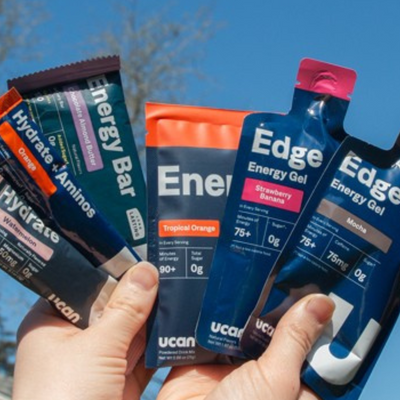By Marnie Schwartz Whether you’re competing in an athletic event, pushing yourself harder at the gym, or dealing with a challenging day at work, mental focus—the ability to concentrate—is crucial. The quality of your diet directly impacts energy levels both in your body and your mind.
In fact, you’ll probably feel the mental effects more quickly than the physical ones, says Bob Seebohar, a board-certified specialist in sports dietetics and a former Olympic Team USA sports dietitian.
Because of its abundance of nerve cells, your brain uses more energy than any other organ: Although it only represents about 2 percent of your body mass, it utilizes about 20 percent of the body’s glucose, a key energy source. Here, we break down the essentials of nutrition for mental focus, plus the best foods to include in your diet to help you stay sharp.
How Carbohydrates Fuel the Brain
“The brain is like a gas tank of carbohydrates,” says Seebohar. After you consume carbs, your body breaks them down into glucose, which is the brain’s primary source of energy. The brain is highly sensitive to fluctuations in blood sugar levels. “Whenever blood sugar in the body goes up and down like a roller coaster, the same thing happens in the brain,” says Seebohar. “When you’re on the downward spiral, your focus starts to decrease.” You can optimize your mental performance—including your attention, memory, and learning capacity—by choosing foods that help keep the level of glucose in your blood as stable as possible throughout the day.How to Eat for Steady Blood Sugar
The most effective strategy for stabilizing blood sugar is to combine carbohydrates with protein and healthy fat at each meal. This will slow the rate at which your body breaks down the carbs into glucose. Also, select complex carbs that have a low glycemic index—meaning they are less likely, on a scale of 0 to 100, to cause your blood sugar to rise.
“On the other hand, when you eat quick-digesting (high-glycemic-index) carbs and sugars like those found in processed breads, cereals, pasta, and candy, you’ll experience a temporary increase in energy,” says Julie Burns, a licensed and registered dietitian, integrative sports nutritionist, and team nutritionist for the Chicago Blackhawks. Your level of insulin—a hormone that regulates blood sugar and helps shutter glucose into cells—surges to handle the flood of glucose but then quickly drops. “This rapid rise and fall lead to an energy crash that can make you feel tired and ‘hangry’ and adversely affect your ability to focus,” Burns explains.
Fiber is particularly beneficial because it is a type of carbohydrate that can’t be broken down by the body into glucose—or lead to blood sugar spikes that can impact cognitive function; fiber also has other important health benefits such as lowering LDL (“bad”) cholesterol and maintaining a healthy weight. If you’re on the go and relying on packaged foods, opting for a UCAN Energy Bar - a sugar-free, ultra-low-glycemic carbohydrate formulated to keep blood sugar steady - is the smart choice for better focus instead of a sugary snack.”
Burns and Seebohar both utilize UCAN products in their work with athletes and clients to optimize physical energy and mental focus. “[These products allow] a gradual introduction of carbs into the body,” says Seebohar, “which supports concentration and focus for longer and gives you that steady energy over hours.”
How Smart Nutrition Nourishes the Mind
Other research has linked high blood glucose levels—in those with Type 2 diabetes—to problems with attention, memory, and executive function. Blood sugar spikes may not just impair your ability to think clearly at the moment. Research has found that high blood sugar levels associated with pre-diabetes or diabetes may also impair cognitive behavior over time. A study in the journal Diabetologia found that people with elevated levels of HBA1C (an average of blood sugar levels over the previous three months) had significantly increased rates of cognitive decline in the next decade.How the Gut and Brain Work Together
Our gut and brain are in constant communication through what’s known as the gut-brain axis, and research has found a link between a healthy balance of bacteria in the gut and improved cognitive function. “Choose carbs with a high fiber content. They will feed the gut and help the microbiome function,” says Seebohar. Studies have also found that a high-sugar diet can lead to an imbalance in bacteria and increased inflammation in the gut. According to Burns, eating plenty of fermented foods such as kimchi, cruciferous and green leafy vegetables, berries, nuts, seeds, and legumes can help fight inflammation and improve your gut health.Your Menu for Mental Focus
“Keeping your blood sugar steady is the single-most powerful strategy for maintaining maximum cognitive function,” says Burns. Here, some tips to help boost clarity.
Choose good carbs
Your brain runs on carbohydrates, but quality matters. Whole foods and high-fiber choices will sustain your energy and help you perform at your physical and mental best better than simple, quick-burning sugars and starches.
Prioritize high-quality proteins and fats
Burns suggests including a variety of wild-caught, cold-water fatty fish such as salmon, grass-fed meat, pastured poultry eggs, coconut oil, ghee, chia seeds, olive oil, and walnuts into your diet. Research has found that the omega-3 fatty acids in fish may help preserve memory and even protect against dementia.
Be picky at breakfast
Properly fueling up in the morning is especially important since you’ve burned through a lot of your energy stores overnight. Choose whole-grain bread with nut butter or steel-cut, slow-cooked oats rather than sugary muffins or simple carbs like cereal and bagels. Other great breakfast options includes Protein + Energy, which are formulated to keep blood sugar levels stable for hours.
Stay hydrated
“The brain needs to be hydrated just like the rest of your body,” says Seebohar, so be sure to drink plenty of liquids. According to a meta-analysis in the journal Medicine & Science in Sports & Exercise, even being mildly dehydrated can compromise attention, executive function, and motor coordination.
Plan for snacks
There’s a reason you crave something sweet in the mid afternoon. Your blood sugar naturally falls a few hours after eating lunch and the result is a slump in energy and your ability to focus. Rather than reaching for a quick fix like a candy bar, prepare for afternoon lulls and pack nutritious snacks that combine protein and good carbs, such as whole-grain crackers and almond butter or an UCAN Energy Bar.








